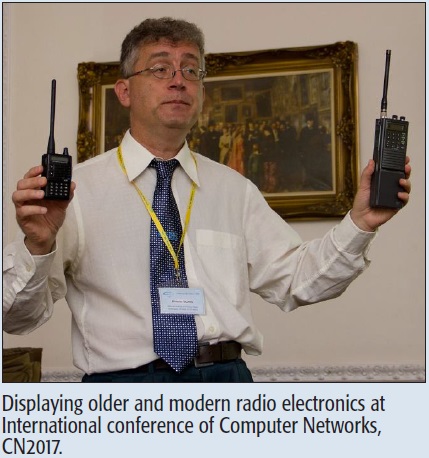
One of the conferences with the longest traditions in IEEE Region 8, The International conference of Computer Networks (CN2017) was held in Zamek na Skale (The Stone Mount Castle), a remote peaceful place in southwestern Poland. The event was dedicated to all activities related to computer networks, distributed computer systems, and nano- and quantum-technologies and molecular networks. Among others, CN2017 included a ‘Teleinformatics and Telecommunications’ track that was focused on topics connected with computer communication technologies considered in the context of computer networking and informatics. Therefore I took the opportunity to give a half-day tutorial lecture on amateur radio communications that represent an alternative method for establishing a virtual network in between computers worldwide. At the same time, that session gave me a good opportunity to display and describe actual radio electronics production, including a comparison of older (‘big and heavy’) and modern (‘small’n’light’) approaches in the area of portable devices.
The 25th jubilee edition of the International Conference on Computer Networks was planned for June 2018 at the Faculty of Automatic Control, Electronics and Computer Science of the Silesian University of Technology in Gliwice, the place where the conference originated.
This time my tour program was very tight, so I had to leave the conference venue almost two days earlier, in order to catch a train to Wroclaw and from there to Rzeszow. After some eight hours on trains, I arrived at the destination where a seminar for students and staff at Politechnika Rzeszówska (Rzeszów University of Technology) was scheduled. There I had an opportunity to talk about an ad-hoc experiment I had made during the train travel, related to tracking my own position (and locations of nearby radio amateurs in Poland) by using my radio equipment and GPS receivers. The lecture was opened by Prof. Dominik Strzalka, vice-dean for development and cooperation with the economy, Faculty of Electrical and Computer Engineering. Two local radio amateurs, Mateusz Lubecki SP8EBC and Adam Nazimek SP8N informed the audience about the actual status in local and regional development of radio communications in the southeast of Poland. After a short one-day stay in Rzeszow, I rushed by another train to Krakow where I had the final activity in this tour: a three-hour informal presentation and discussion with local technology enthusiasts. The event was promoted on the social media pages of the SP9KPG amateur radio club, OT12 division of PZK (Polish amateur radio union) and HS Kraków Foundation.
The 2017 IEEE/IFIP International Conference in central Asia on Information Science and Communications Technologies (ICISCT 2017) was held in Tashkent, the capital of the Republic session, a keynote during the opening session, as well as a four-day seminar (‘training’) for local students and teachers. The conference was greeted by the H.E. Minister for development of information technologies and communications.
Although ICISCT 2017 was a rather pioneering event of that kind at TUIT (Tashkent University of Information Technologies), the whole three-day program went smoothly, thanks to the organizational efforts of Mr. Javlonbek Abdujalilov, head of the International Relations Department and assistant professor in the Telecommunication Engineering Department. As expected in that post-soviet part of mid-Asia, the majority of domestic participants were not very fluent in English (but were rather good in Russian), so the assistance in translation was provided by Ms. Nayira Ibragimova from the English language department of TUIT, who also provided much help during the radio seminar.
Besides academic activities, the organizers provided a rich social program for a small number of foreign guests, visiting local attractions of national and historical importance, as well as tasting local delicacies. During a gala dinner with TUIT’s vice-rector, the guests were informed about the ambitious plan for the period 2017-2021, when TUIT should become the most prestigious university in the country, while Uzbekistan would achieve the leading position among the countries in central Asia.
The four-day amateur radio seminar was organized into 80-minute lectures per group, where three groups of participants (two student groups, one teacher group) were attending the sessions each day. Thanks to the efforts of TUIT’s rector, Prof. Teshabaev, I received special permission from the Ministry for Development of Information Technologies and Communications to temporarily import radio transmitting equipment and accessories and bring them to the University. That was an opportunity for seminar participants to become familiar with foreign technologies.
My overall impressions were positive. Both young and seasoned participants have expressed visible interest in starting amateur radio activity and in establishing a ‘ham club’ at TUIT. In years to come there will be more tutorials and workshop sessions. Prospective presenters are welcomed to contact me at skoric@ieee.org.